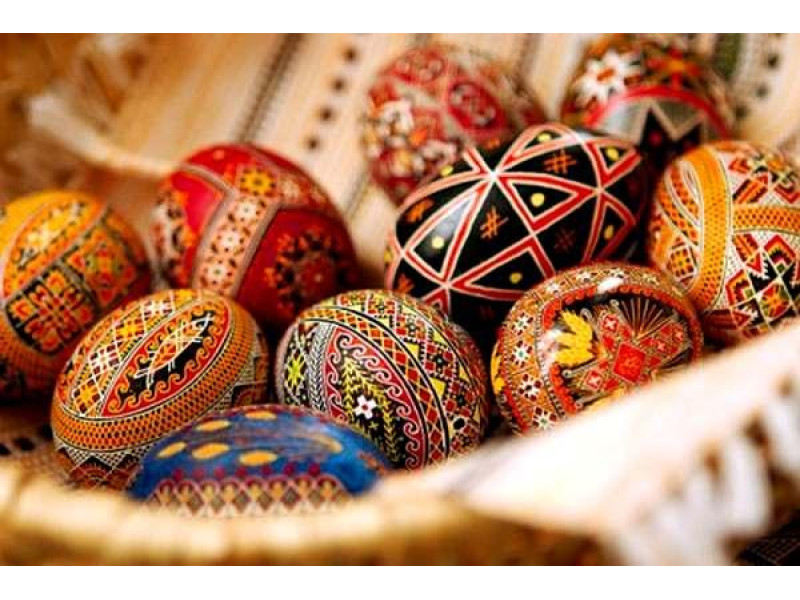History of the Holiday
"Easter", "Easter", "Resurrection of the Lord" - all these names have long been used by us to announce, without a doubt, one of the most important holidays in the culture of the Ukrainian people. But did you know that in fact these are three different holidays, which historically intertwined and manifested themselves as one, which we are used to seeing in the spring?!
The origins of this grand event can be traced back to pre-Christian times, when our ancestors celebrated the most important day of spring – Easter – on March 22. Solemnly celebrating the victory of the spring season over the winter season, each family baked “Easter kalachi” and dyed eggs, which later transformed into the Easter cakes and Easter eggs we are familiar with.
Strangely enough, the Jews also introduced this holiday into their calendars long before the banner of Christianity was raised on the horizon. This day marked for them the exodus from Egyptian slavery. In fact, the very word "Passover", which comes from ancient Hebrew, means "liberation, passage."
The main canons and rules for celebrating Easter were established after the birth of Christ. The Ecumenical Council of the Churches in 325 in the city of Nicaea was convened mainly to determine the date of the celebrations. They decided that the celebration should take place on the first Sunday following the first full moon after the vernal equinox. If the date coincides with the celebration of Passover among the Jews, then Orthodox Easter is moved a week later. These very specific canons are still observed today.
Palm Sunday
The Sunday before Easter is popularly called "Palm Sunday." On this day, people gathered near the temple, and priests consecrated willow branches. According to Christian sources, when Jesus Christ entered Jerusalem on a donkey, people paved the way for him with palm leaves. Since the climate of Ukraine was not ready for palm trees, they decided to replace them with willow.
The first to try to grab the willow in the church were the children, because the happiest fate awaited the one who would catch the most branches. Then the young people walked through the streets with cats and hit each other, adding: "I don't hit - the willow hits, Easter is in a week, Not far away - a red egg."
"Maundy" Thursday, Good Friday and the last festive preparations
After Palm Sunday, Holy Week begins. It is difficult to overestimate its importance for believing Ukrainians. Each day has its own specific symbolism, but the most important countdown begins with Thursday, which is popularly called "clean."
For a long time in Ukrainian villages this day has been associated with saying goodbye to everything old and meeting something new, bright. People throw out old junk, whitewash their houses, do the most general cleaning. It is believed that on this day the dead return to earth to celebrate Navsky Easter ("Easter of the Dead", from "nava" - the afterlife). On the following Sunday after Easter they return to paradise-viry.
Maundy Thursday is considered a day of spring cleaning. It has long been customary to clean the livestock, clean the stables and barns before sunrise. On this day, children were cut to prevent hair from falling out and to grow lushly.
On Good Friday, it is "recommended" to refrain from loud music, swearing, and generally to sort out your own thoughts.
On the Saturday before Easter, the landlord's duties included preparing a basket for the consecration of the food - it was washed and dried in the sun during the day, and in the evening it was filled with Easter delicacies and decorated with a towel. Late in the evening, it was customary to gather around the fire in the church backyard. The boys told fairy tales, legends, and adventure stories.
Easter and gastronomic and Easter egg customs
Undoubtedly, it is customary to set rich tables for Easter, so there are also many culinary holiday traditions.
The Easter cakes themselves are usually baked on Thursday or Saturday. This process must be accompanied by complete silence and peace in the home. Among those who do not have a family tradition of baking Easter cakes, Easter cakes are currently very popular, filling the shelves of stores. Confectioners demonstrate unsurpassed skill in decorating Easter cakes. Here you can find candied fruits, raisins, almonds and icing, chocolate, and other festive treats.
A special mention should also be made of Easter eggs. The ornaments used in Easter egg making have very deep roots. Some of them originated in the steppes of the Black Sea region and are closely related to the plots of the gaivok. Easter eggs were also considered an Easter symbol of love - girls gave the best of them to boys, thus confessing their feelings. A large number of children's games and magical rituals were also associated with Easter eggs.
In addition to baked and cheese Easter cakes, Easter baskets also include Easter eggs, pies, homemade sausages, meat, horseradish, and sometimes Cahors.
The night before Easter is the most solemn and festive, during which people stay up all night to have happiness and harmony for the coming year. All-night liturgies are served in churches, and in the morning believers break their fast and greet each other with the traditional "Christ is Risen!" - "Truly He is Risen!"
The faithful bless a basket of goodies in the morning in church, after which they go home for a festive meal - "breaking the fast."
Morning breaking of the fast takes place in different parts of Ukraine. A typical variation of this custom is the host's triple circumambulation of the festive table. Holding a bowl filled with consecrated dishes and facing the icons, the host cuts several consecrated Easter eggs on a plate and offers a piece of egg to each family member's mouth, saying: "Grant, God, that we may also wait for the holy Resurrection of Christ in happiness and health this year!" This rite is widespread in Podillia, Volyn, and Bukovina.
In the Dnieper region and in the western regions of Ukraine, people break their fast without any special rituals. The main rule is to try not to let a single crumb of consecrated food fall to the ground. They are then thrown into the fire, "so that the mice don't eat it." According to popular superstition, a mouse that eats a consecrated food immediately turns into a bat and will fly over the head of the person who dropped the consecrated food on the ground.
It is not worth abusing alcoholic beverages during the fast (as well as at any time, in general), because "if you get drunk on the fast, you will walk around as if half asleep for the whole year."
In the Tavria region, for those who were traveling and physically unable to be at the Easter table with their families, the housewife would cut off a piece of Easter cake and, wrapping it in a towel along with three Easter eggs, would place it on the altar. Later, on Ascension Day, the gift was given to the beggars (in the event that the travelers had not yet returned).
In Polesie, after breaking the fast, it is customary to wash oneself by placing two Easter eggs and a copper coin in a bowl. The water itself is then poured onto a fire or into a body of water. In Slobozhanshchyna, after finishing the festive meal, people usually go to the cemetery and place Easter eggs and other Easter treats on the graves.
"Drenched" Monday
In some regions of Ukraine, the tradition of dousing oneself with cold water on Easter Monday is preserved, which is why it is called “doused Monday.” The basis of this “doused tradition” is the belief in the cleansing qualities of water.
The traditions of "watered" ("drenched") Monday have been most fully preserved in Western Ukraine. On this day, the day after Easter, boys pour water on girls, and in return they give them Easter eggs or other dishes from the Easter table. It was considered a shame if someone passed by someone's house and did not pour water on the girl there. In the Lviv region, Watered Monday is still celebrated today. Thus, one of the places where the authorities officially allowed dousing was Rynok Square, where everyone could then go to dry off and warm up in the nearest cafes.
The third day of Easter is the day of the holiday farewell. Young people gathered for dancing, games and entertainment, the so-called "street" begins - youth parties in the open air. This event lasts until September 14 - until the harvest begins. This tradition has a good effect on friendly (and not only) relations.
Easter signs and superstitions
Among the large number of superstitions that Ukrainians believed in, let's recall the most interesting ones, especially those that have nothing to do with religion. It is worth mentioning here that among our readership there are representatives of various religious denominations, as well as atheists, and precisely because of this, in order not to offend anyone and not to impose anything, this material is written in a rather restrained style, distant (as far as possible) from religion. So, on to the superstitions.
The attitude towards kisses during the Easter period was quite interesting: it was believed that if you kissed on the threshold during the holidays - it was to separation, under a tree - to joy, under the croaking of a crow - to tears or a quarrel. If a girl dreamed of kisses, then trouble would await her. Itching of the lips meant that love kisses were not far off.
Easter night was not spared from folk beliefs. There was a belief that all "evil spirits" (demons, witches, werewolves) were especially dangerous in the period from Good Friday to Sunday morning, so one had to be very careful.
Professional Ukrainian gamblers believed that if one stood through the entire Easter service with an ace of spades in his pocket, responding to the priest's exclamations of "Christ is Risen" - "cards here", "aces here", he would be lucky in gambling all year long.
If you believe the signs and beliefs that exist in the Kyiv region, "when you break your fast on Easter and go out of the house onto the street, then the first thing you see is what you should look for - you will have good luck." "If the sky is cloudy or it is raining on this day - there will be a good harvest."
Also, on Easter, every peasant considered it necessary to pull the rope at least a few times and ring the bell: this brought good luck and... buckwheat gave birth, the people believed.
Author: Maksym Timchenko.






Write a comment